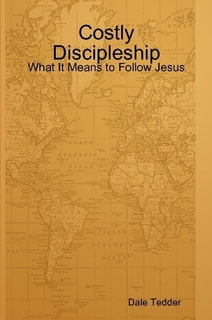|
Lesson 4
The Cost of Following Jesus Luke 9:57-62
1. Read Luke 9:57-62 twice. Write down any key ideas or phrases that catch your attention. What are the key principles you believe we ought to draw from this text? Why did you choose those principles? 2. Our Scripture in this lesson provides a picture of just how rigorous the life of discipleship Jesus calls us to, really is. In these brief verses we observe three people agreeing to follow Jesus, under their terms. Jesus teaches us that following him must never be according to our terms, but his. The first person to approach Jesus said he would follow him wherever he went. How did Jesus respond to him (vv. 57-58)? What did Jesus mean with his seemingly peculiar response (See John 5:18; 6:66; Matthew 8:34; 27:33)? What had the person perhaps not understood? 3. Read Luke 9:51-56. How does this story of the Samaritan village help explain the words of Jesus in verse 58? What might such rejection look like today for those who follow Christ? What are some ways disciples of Jesus can prepare themselves to experience the solemn warning of Christ in verse 58? 4. What was the second person’s reply to Jesus, upon being called to follow him (v. 59)? 5. Read Matthew 15:1-9. Based on this text, do you think Jesus had a problem with a person honoring their parents? Explain. What did Jesus discern as the real motivation behind the person’s response (Luke 9:60)? 6. Compare and contrast the would-be follower of Jesus in verse 59, with Levi, in Luke 5:27-28.) List three ways people today respond similarly to way the person in verse 59 did. Have you ever responded like that? Why? 7. On the surface, the request to bury one’s father was reasonable, as was the request made by the third person in verse 61. Reread verse 61. What, in the way the request was phrased, do you think raised a red flag of caution for Jesus? 8. How did Jesus reply to the person’s request (v. 62)? What are some key principles we need to learn from our Lord’s response? 9. Having a divided heart is one of the reasons we continue looking back, instead of putting our hands to the plow and moving forward with Jesus. Read 1 Kings 18:21; Philippians 3:13-14; 2 Timothy 2:21. What do these verses teach us about becoming “fit for the kingdom of God” (Luke 9:62)? 10. List three principles the interactions in Luke 9:57-62 teach us about the priorities of the Kingdom of God? (See also Matthew 6:33.) 11. Read Luke 14:25-35. Once again, Jesus plainly told those who followed him to count the cost of doing so. Many who followed Jesus throughout his public ministry did so because he fed them or because they saw miracles. But, as Pastor Kyle Idleman has pointed out, there’s a big difference between being a fan of Jesus and committed follower of him. What did Jesus say in this text to make that point? Walking Points 12. Do you think it is important to be up front and honest with people about the cost of following Jesus? Explain. How do some churches and/or evangelists you know of, hide the costly nature of following Jesus? Why do you think they do so? 13. Have you ever been guilty of “hiding the cost” of following Jesus when sharing your faith with others? Explain. 14. Did you know the cost of following Jesus when you first started out on your faith-journey with him? Share a little about your experience. 15. Based on what you learned in this lesson, how would you share with a family member or friend what it means to genuinely follow Jesus?
0 Comments
|
Click the image to buy the study guide to use with your small group or for personal use.
Categories
All
Archives |


 RSS Feed
RSS Feed
